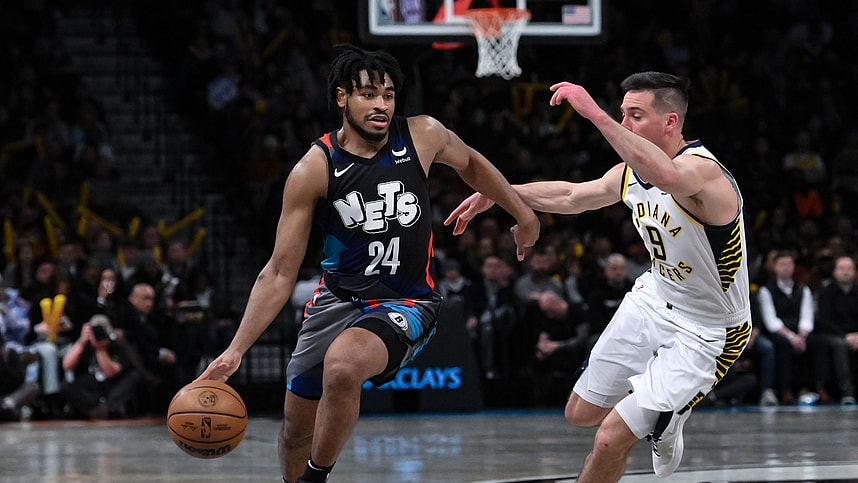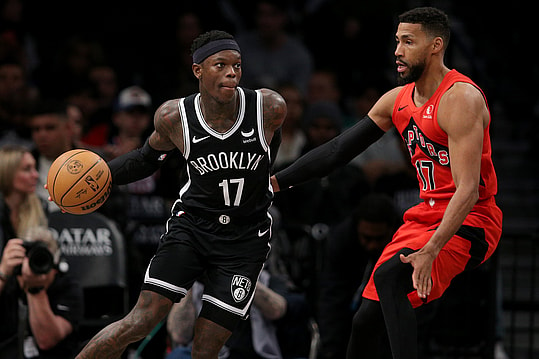
The Brooklyn Nets will not win many games this season as they look to rebuild after unsuccessfully trying to thread the needle between contending and rebuilding following the implosion of the Big Three Era. While the team has compiled a collection of intriguing young players, one big question looms for their hopes of playing competitive basketball during the 2024-2025 season. Who will score the basketball?
Following the Mikal Bridges trade, the Nets have a hole on their roster, as they will be missing 19.6 points per game. While there doesn’t seem to be another player on the roster ready to increase their scoring load to that level, there are a few options who could prove capable of taking their offensive game to the next level with more opportunities.
Even with Bridges, the Nets ranked just 25th in points per game last season at 110.4. In terms of offensive efficiency, they weren’t much better, ranking 23rd at 113.2. No matter what, this will not be a high-powered offensive in 2024-2025, but we’ll look at who can step up and provide some offensive firepower above and beyond expectations.
Can Cam Thomas continue to grow as a scorer with the Nets?

While Bridges was the biggest name on the Nets, it was Cam Thomas who led the team in scoring at 22.5 points per game last season. Thomas was described as a walking bucket coming out of LSU and while the first couple years of his career have seen his opportunities come and go, last season he proved that he can score at a high level in the NBA.
Thomas has other areas where he needs to develop his game, but does he have another level to unlock as a scorer? At times last year, it seemed as if the only person who could stop Thomas from scoring was former head coach Jacque Vaughn. Thomas agreed, getting frustrated at times by his role shifting constantly from starter to coming off the bench, and felt that coming off the bench limited his ability to score. There’s some truth to that as even though he was the primary scoring option off the bench, his scoring dipped from 23.6 points per game as a starter to just 18.5 points per game as a reserve.
The more pressing issue is whether or not he can score more. Thomas was 10th last season in usage rate at 30.5%, so there is not much more room for growth in terms of playing with the ball in his hands. While he may see an uptick by a couple of percent, it’s not going to be enough to make a tremendous difference. As a shooter last season, he was relatively efficient converting 44.2% of his field goal attempts, 36.4% of his three-point attempts on six attempts per game, and 85.6% of his free throw attempts on 5.1 attempts per game.
If he’s able to improve his efficiency a bit more, he will reach the 25+ points per game threshold, but as a whole for the Nets, that won’t do much to improve the team’s overall scoring output. In his own right, he’s a fantastic offensive player, but he will need help.
Dennis Schroder’s role may allow him to take on some additional scoring load

Dennis Schroder just turned in a dazzling performance for his native Germany in the Paris Olympics and showed why he could be a top scorer for Brooklyn. The 6-1, 172-pound point guard may not be the strongest on the court, but he has the speed, quickness, and craftiness to get to the basket and score. Not only that, but throughout his career he’s proven to be a decent spot-up shooter once the ball comes back around to him on the perimeter, shooting 34.2% beyond the arc for his career and 37.5% last season.
For Schroder, the scoring punch he provides will depend greatly on his role. His career high in points per game is 19.4, which came during the 2017-2018 season when he was one of the primary scorers for the Atlanta Hawks averaging 17.1 field goal attempts per game.
More recently, Schroder has settled into a primary facilitator role since coming to the Nets. Last season, Schroder recorded a 7.8 passer rating which put him in the 93rd percentile in the league, per craftednba.com. That ability and willingness to set other players up to score led him to average just 14.0 points per game, which is also his career average.
The question for Schroder will be whether or not the Nets stagger the minutes he and Cam Thomas play, or play them together most often as a backcourt duo. If they’re staggered, Schroder will have the space to be the primary scorer on the court for the bulk of his minutes, whereas if he’s often sharing lineups with Thomas he’ll more often be tasked with initiating the offense and setting Thomas up for scoring opportunities.
- Nets have had busy offseason despite mulling Cam Thomas’ future
- Nets select polarizing prospect Egor Demin with No. 8 pick in NBA draft
- What can Nets’ former All-Star provide to contending teams following contract buyout?
Don’t overlook Trendon Watford

Trendon Watford is one of the most unique players on the roster. While he looks like the prototypical stretch-four who will stand out at the three-point line and occasionally operate as a scorer and rebounder in the low post, the 6-9 240-pound power forward actually plays the game much differently.
Instead, Watford can create shots for both himself and others with the ball in his hands and act as a point forward. He doesn’t always stay in control, but his combination of ball handling, size, strength, length, and shooting touch can prove to be difficult to stop. On top of that, he’s proven to be a dangerous three-point shooter, shooting 39.7% from beyond the arc last season and 35.9% for his career.
The question for Watford isn’t whether or not he can score, but whether or not he’ll be given the opportunity. Last season, Watford averaged just 13.6 minutes per game while scoring 6.9 points per game. His career high for minutes per game in a single season throughout his three-year career is just 19.1. The Nets have a crowded frontcourt, so it remains to be seen what their plans are for Watford and if he’ll see greater scoring responsibilities placed on his shoulders.
The Nets will have to carve out clear roles for everyone
Cam Thomas will get his buckets, without a doubt. The question is who else scores? For Schroder, this all depends on how much responsibility falls on his shoulders to make plays for others. With only him and the oft-injured Ben Simmons as experienced point guards, it seems unlikely he’ll be a primary scorer, but if he is, then who sets up the table for the other players on the roster? Either way, there’s a ceiling on the efficiency.
The X-Factor is Watford. If he is given enough playing time he can alleviate some of those playmaking responsibilities from Simmons and especially Schroder, while also serving as a dynamic scorer from anywhere on the court. The questions there, however, are whether he’ll break through a crowded forward rotation to make that reality come to fruition, and whether or not he’ll maintain his efficiency over a larger workload.
More about:Brooklyn Nets